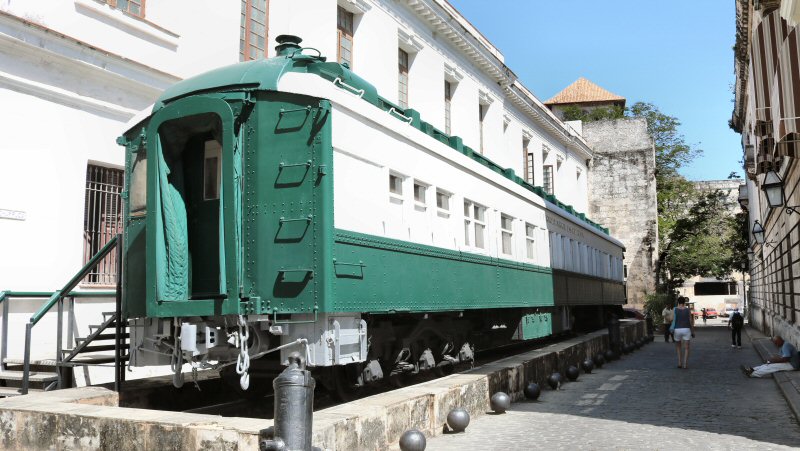
The perfectly restored train coach
is an important part of the project, managed by the Office
of the Historian of Havana, to rescue the historical memory,
to honor relevant figures and to commemorate the significant
dates by the participation of the community.
In 1900 the American Car and Foundry
Company, the manufacturer of railroad rolling stock in the
United States, was commissioned by the Pennsylvania Railroad
Company, to manufacture three special wagons that the
businessmen and the politicians would benefit in their long
work trips. The provisional identification numbers of those
wagons were 97, 98 and 99 respectively.
The first one with the number 97
that was baptized with the name of Pennsylvania, was
destined for the Pennsylvania Railroad itself, and currently
it is on display in the Railway Museum of Pennsylvania. The
second one with the number 98 was handed over to the
company’s representatives in Mexico, and it was called El
Dorado, as a tribute to Mexico’s struggle for independence.
The third one with the number 99 was consigned to the
American-owned Cuban Railroad Company and transferred on a
board of a ferry from Florida to Cuba. It arrived in the
island in 1912.
It received the name Wagon or Coche
Mambí, in honor of Tomás Estrada Palma
(1835-1908), the first President of the Republic from 1902
to 1906, and a hardy fighter of the Mambí Army. It was put
also into service of the successive Presidents of the
Republic. Even though it was known as the presidential coach
in the community, its correct name is Coche Mambí. The name
Mambí refers to the soldiers that fought in the Independence
War at the end of the 19th century.
The excellence in comfort and safety
of the Coche Mambí made it very appreciated by the
successive Presidents that traveled the island, such as José
Miguel Gómez (1909-1913), Mario García Menocal (1913-1921),
Alfredo Zayas (1921-1925), Fulgencio Batista (1952-1959) and
even Fidel Castro. After the revolution in 1959, it was
parked on the platform “La Cochera” in the Central Railway
Station (Estación Central del Ferrocarril). Since 1987 it is
on the display at its current place.
The 80 tons coach is produced as a
combination of iron and precious woods with an exclusive
interior. The elegant mobile home consists of a protocol
room, four bedrooms with foldaway beds and shower baths, a
dark-wood dining room for eight persons and a kitchen with a
refrigerator. Two of the four bedrooms were reserved for the
use of the President and his wife. The original mahogany
furniture and the lamps are preserved, as well as the
tableware and the set of the silver cutlery with the
inscription Mambí. Originally carbide lighting was used, and
cooling of the space was accomplished by using dry ice.

